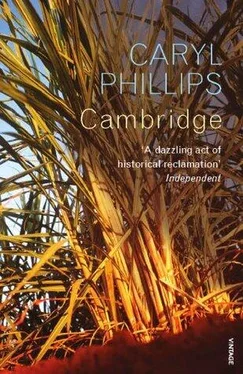Caryl Phillips - Cambridge
Здесь есть возможность читать онлайн «Caryl Phillips - Cambridge» весь текст электронной книги совершенно бесплатно (целиком полную версию без сокращений). В некоторых случаях можно слушать аудио, скачать через торрент в формате fb2 и присутствует краткое содержание. Год выпуска: 2009, Издательство: Vintage Digital, Жанр: Современная проза, на английском языке. Описание произведения, (предисловие) а так же отзывы посетителей доступны на портале библиотеки ЛибКат.
- Название:Cambridge
- Автор:
- Издательство:Vintage Digital
- Жанр:
- Год:2009
- ISBN:нет данных
- Рейтинг книги:5 / 5. Голосов: 1
-
Избранное:Добавить в избранное
- Отзывы:
-
Ваша оценка:
- 100
- 1
- 2
- 3
- 4
- 5
Cambridge: краткое содержание, описание и аннотация
Предлагаем к чтению аннотацию, описание, краткое содержание или предисловие (зависит от того, что написал сам автор книги «Cambridge»). Если вы не нашли необходимую информацию о книге — напишите в комментариях, мы постараемся отыскать её.
Cambridge — читать онлайн бесплатно полную книгу (весь текст) целиком
Ниже представлен текст книги, разбитый по страницам. Система сохранения места последней прочитанной страницы, позволяет с удобством читать онлайн бесплатно книгу «Cambridge», без необходимости каждый раз заново искать на чём Вы остановились. Поставьте закладку, и сможете в любой момент перейти на страницу, на которой закончили чтение.
Интервал:
Закладка:
We travelled slowly, making full use of the sea-breeze, that friend to sufferers from the conquering heat, essaying only the occasional forays up inland paths in order that Arnold might point out some particular tree, or place of historical interest. Once back upon the main highway, we allowed ourselves but one extended interlude, pausing by a low and loosely assembled stone wall which bordered the road with the high design of guarding against accidents. From over this wall, I peered down at the surface of the sea, smooth and mirror-clear, except where the breakers played over a series of long reefs, far out from shore, and threw up their beautiful but treacherous spray in seemingly playful showers. From ledges upon the face of the rocky precipice on whose summit we stood, sea-birds plumed their ragged feathers and watched alertly for their prey. That great king of birds, the pelican, was on the wing, plying the air, then swooping down to the surface to gather provisions into its ample bill. Sadly, Arnold and I could not tarry long in this sultry atmosphere, for the heat soon became unsupportable and I yearned for that soft cooling breeze brought on by movement of our carriage.
Just beyond the village known as Butler's, Arnold drew the carriage to a halt beside a broad stream which coursed through the cane-pieces. He did so in order that I might have the opportunity to observe some negroes engaged in washing clothes. The negro men wore hats, but it was too late to protect their complexions, for nature had already painted them a shade too dark. They did no more than stand and watch as their women performed the domestic ritual, pounding clothes against stones, and then rinsing these rags in the turbid water. The appearance of the females was truly disgusting to me, for without a single exception their arms were drawn out of their sleeves and from the waist upwards they were in a state of unashamed nakedness. One woman, her hair matted with filth, and, I imagine, her flesh host to countless forms of infestation, stood in a condition of total nudity in the centre of the stream. Long encrusted with dirt by her labours, she now scrubbed away at the small rolls of grease with her soapless hands. Eventually she stepped clear of her muddy brown bath, and as the water beaded on the shining surface of her newly bright skin she merely lifted her head to the heavens and imbibed the heat of the sun, which would soon dry her ebon hide. Arnold informed me that such habits of cleanliness were uncommon in these people, who prided themselves on their infrequent use of water. However, where it occurred it was to be encouraged.
Towards midday we reached the capital, Baytown, the point where I began my residence in the West Indies. The town was much as I remembered it. I looked on with barely concealed excitement as a wave of people broke into view, busy, yet no less elegant for that, all occupied with their small colonial businesses. I noticed immediately that in this city the spirit of ostentation enjoyed full play in dress. Love of fine fashions appeared to be in vogue, and a solitary shop made much of its knowledge of home styles. Every quarter a new delivery of such elegance, either direct from London, or from Paris by way of Martinique, found its way into the establishment so that the half-dozen ladies of style might feel comfortably accommodated. Such exquisitely fashioned clothing must, in these climes, give cause to considerable discomfort. Arnold and I observed a cluster of men half melting under heavy, richly embroidered coats and waistcoats, and a solitary English belle dad in the thickest taffetas and satins, some embossed with gold and silver brocades. Even the military men, consisting mainly of Infantrymen and Carbineers, were duty-bound to labour in scarlet wool, which seemed a most unnecessary burden on an already over-worked body of men. Having displayed their courage and won their laurels in the field of Mars, they now seemed embattled and near defeat under the assault of the tropical climate.
Baytown itself boasts perhaps 3,000 to 4,000 persons and no more than 1,000 houses. The greater number of the presentable white houses are painted in cool shades and boast covered galleries running along either the side or the front where their inhabitants might gather and enjoy sweet conversation, or simply observe the daily goings-on within their little colony. Many of these dwellings are shaded by abundant trees of all descriptions clustered together in small, but well-tended gardens. The shops are designed in three grades; firstly, a species of wooden room about six or eight feet square which allows the plying of various low trades, such as tanning and the like. Secondly, the stores of the retail provision dealers, which are on a larger scale and supplied amply with goods. Finally, the merchants' stores or warehouses, often annexed to workshops or lumberyards. The other buildings of note include: St George's Church and Churchyard, the Government House, the Arsenal, the Court-House, the Ebeneezer Chapel, which rightfully belongs to the members of the Methodist Society (where espionage is carried out to weaken the proper bond between master and slave), and the Gaol, where I am led to believe the men are separated from the women, and the debtors from the cruel felons. The only other meeting-places of note are the grog-shops which play host to crowds of jetty revellers, bawds of all shades, and the lower kind of white soldier or sailor. They gather together in these dark places, their eyes and teeth gleaming, and greedily quaff their noxious swill, which must, sooner or later, prey upon their constitutions. To those enervated by age or infirmity, drinking grog remains a last consolation, but by far the greater number of these wretches are in a state of tolerable health. Arnold stopped briefly by the lamp-lit entrance to one such satanic den, where my ears were assaulted by fearsome curses, idiotic laughter, discordant song, and all the stumbling incoherence that accompanies the advanced stages of intoxication.
The streets of Bay town are uncommonly broad and straight, and in places two carriages might comfortably pass without danger to either. On the subject of horse and carriage, Mr Brown was eager for me to observe the lamentable equipage which in these parts is allowed to enter the ranks of the socially acceptable. Two sorry horses, one perhaps of fourteen hands and white in colour, the other a rough brown beast resembling a Shetland pony, are often to be observed shackled incongruously together, sometimes as different in temperament as they are in appearance. I was witness to a debate about the virtues of travelling to the east or to the west conducted by two such jades whose mouths were evidently the most obdurate that had ever tugged against bit and bridle. Their violent contention marooned their hapless driver squarely in the street, he being unable to entreat either beast to give way to the other. Some half-hour elapsed before the traffic was once more able to flow.
A sight to which I found it difficult to reconcile myself was the number of apparently free blacks wandering the streets, shoes on their feet, their unstockinged legs shining like twin columns of jet. It seems that some of these blacks are indeed free, having earned their manumission by their master's generosity, by some good deed, or by thrift and self-purchase, but the majority of these African brethren remain slaves to townsmen, and are employed as servants, porters, and artisans. Black carpenters, coopers, blacksmiths and masons abound, and they are hired out by their owners to assist the other townsmen in their labours. Some are allowed freely to seek labour, but bound to pay their masters a specified sum per day or per week, depending upon the individual arrangement, but the dress, manner and gait of these relatively civilized town slaves marks them off as a wholly different breed from their brutish country cousins.
Читать дальшеИнтервал:
Закладка:
Похожие книги на «Cambridge»
Представляем Вашему вниманию похожие книги на «Cambridge» списком для выбора. Мы отобрали схожую по названию и смыслу литературу в надежде предоставить читателям больше вариантов отыскать новые, интересные, ещё непрочитанные произведения.
Обсуждение, отзывы о книге «Cambridge» и просто собственные мнения читателей. Оставьте ваши комментарии, напишите, что Вы думаете о произведении, его смысле или главных героях. Укажите что конкретно понравилось, а что нет, и почему Вы так считаете.












